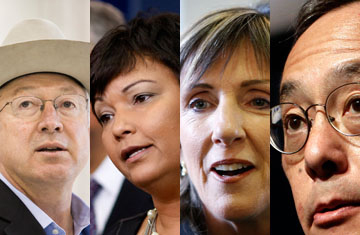
Salazar; Jackson; Browner; Chu
Here's how it's supposed to work: environmental agencies try to protect the planet, and industry tries to destroy it. Environmental policy is whatever the government works out in the middle. O.K., so that may be a slight simplification. But it's true enough that when it goes wrong you notice. Take George W. Bush's White House, in which the watchmen stopped watching and government agencies set up to regulate industry were happily co-opted. The result: one of the least environmentally friendly Administrations in recent history, and the U.S. lagging on everything from climate change to fuel efficiency to endangered species.
The new White House takes a different approach. From Carol Browner in the newly created position of climate czar to Environmental Protection Agency (EPA) head Lisa Jackson, and Interior Secretary Ken Salazar, President Obama has established a team that makes greens ecstatic. There may be complaints about the lack of emphasis on certain issues, but no one debates that the right people are finally in place. "This is the best team I've ever seen," says Jonathan Lash, president of the Washington-based World Resources Institute.
Obama's first hint that his Cabinet would take on a greener tinge came when he appointed physicist Steven Chu as the Secretary of Energy. Chu, the first Nobel Prize winner to be appointed to a U.S. Cabinet, was given the job of turning the dusty Department of Energy into the incubator for tomorrow's clean-power solutions. Then came a series of picks that show fact will be respected in this White House: Jane Lubchenco, a marine biologist, as head of the National Oceanic and Atmospheric Administration; Harvard's John Holdren as science adviser; Browner, a former head of the EPA, in the new climate role. "The President means business, and so do we," says Lubchenco.
On the political side, the EPA's Jackson has started to reverse some of the Bush Administration's most controversial environmental policies. This spring the entire Cabinet came together to support Obama's plan to raise fuel-efficiency requirements for U.S. automobiles — a decision that will save millions of tons of carbon dioxide. Energy and the environment will always have to fight for resources in Washington — especially in the teeth of a major recession — but greens finally believe that the White House has its priorities right. "We bring all the pieces of the Administration that have a stake in this together," says Jackson. "It's a matter of working together as a team."